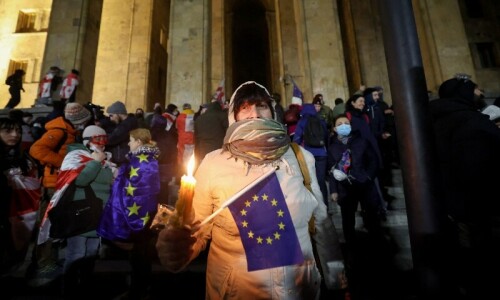KABUL: The Afghan government could implode after Nato troops pull out in 2014, particularly if presidential elections are fraudulent, a report by the International Crisis Group said on Monday.
“There is a real risk that the regime in Kabul could collapse upon Nato’s withdrawal,” said Candace Rondeaux, the ICG’s senior Afghanistan analyst. “The window for remedial action is closing fast.”
The report — “Afghanistan: The Long, Hard Road to the 2014 Transition” — said the country was on course in 2014 for another set of fraudulent elections after the chaotic presidential and parliamentary polls in 2009 and 2010.
A repeat could undermine what little hope remains for stability after the Afghan government takes full responsibility for security from US-led Nato forces, the analysis by the respected Brussels-based group said.
The coalition, which has waged an 11-year war against Taliban insurgents, is drawing down its troops from a peak of some 130,000, and almost all combat forces are scheduled to quit the country by the end of 2014.
“The Afghan army and police are overwhelmed and underprepared for the transition,” said Rondeaux. “Another botched election and resultant unrest would push them to breaking point.”
Within hours of the report’s publication, a suicide car bomber rammed a police station in Lashkar Gar, capital of southern Helmand province, killing two intelligence agents and wounding 15 other people.
Afghan police are increasingly targets of such assaults as they take a bigger role in the fight against the Taliban ahead of the Nato withdrawal.
The western-backed government of President Hamid Karzai and the parliament have failed to take any serious steps towards preparing for a clean vote, Rondeaux said.
“Karzai seems more interested in perpetuating his own power by any means rather than ensuring credibility of the political system and long-term stability in the country.”
The president is constitutionally required to step down at the end of his second term in 2014, and has said he will do so, but there are fears that he might try to manipulate the polls to ensure the election of an ally, possibly one of his brothers.“The danger is President Karzai’s top priority is maintaining control, either directly or via a trusted proxy,” Rondeaux said.
“He and other leading members of the elite may be able to cobble together a broad temporary alliance, but political competition is likely to turn violent on the heels of Nato’s withdrawal.”
The report said the possibility cannot be excluded that Karzai will declare a state of emergency as a means of extending his power, which would accelerate state collapse and likely precipitate a civil war.
“If that occurs, there would be few opportunities to reverse course in the near term. Securing the peace in Afghanistan would then remain at best a very distant hope,” Rondeaux said.
The ICG is not alone in predicting trouble ahead. Afghan expert Gilles Dorronsoro of the Carnegie Endowment for International Peace also sees renewed strife and even a Taliban return to power.
“After 2014, the level of US support for the Afghan regime will be limited and, after a new phase in the civil war, a Taliban victory will likely follow,” he wrote in a recent analysis.
This sort of forecast contrasts sharply with predictions by the Nato military and western governments that Afghan forces will be able to defend the country after 2014, but it is so widespread that Karzai has railed against it.
“This is a psychological war by the western media against Afghanistan: once the foreign troops pull out, Afghanistan will be poor, there will be civil war and the Taliban will return, etcetera,” Karzai told a news conference last week.
However, he noted that “local media, television and radios and analysts” were making similar predictions.—AFP















































Dear visitor, the comments section is undergoing an overhaul and will return soon.